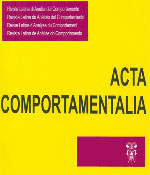Conducta, juegos de lenguaje y criterios de validación del conocimiento
Main Article Content
Abstract
Based on the notion of language-game, as formulated by Ludwig Wittgenstein, the relation ship between language, individual practice, belief and knowledge is examined. Knowing is identified as context-adjusted behavior, under learning or extended exercise, while beliefs are considered as dispositional categories which ground the use of knowledge as adjustment. A computer-based simulation task is described. This experimental task includes four functional dimensions of believing and analyzes their influence on new tasks that involve adjusting practices to daily situations. The results of this exploratory study are presented and their usefulness for the experimental analysis of behavior in relation lo social systems of knowledge and beliefs is discussed.
Downloads
Article Details

<a rel="license" href="http://creativecommons.org/licenses/by-nc-sa/4.0/"><img alt="Licencia de Creative Commons" style="border-width:0" src="https://i.creativecommons.org/l/by-nc-sa/4.0/88x31.png" /></a><br />Este obra está bajo una <a rel="license" href="http://creativecommons.org/licenses/by-nc-sa/4.0/">licencia de Creative Commons Reconocimiento-NoComercial-CompartirIgual 4.0 Internacional</a>.
